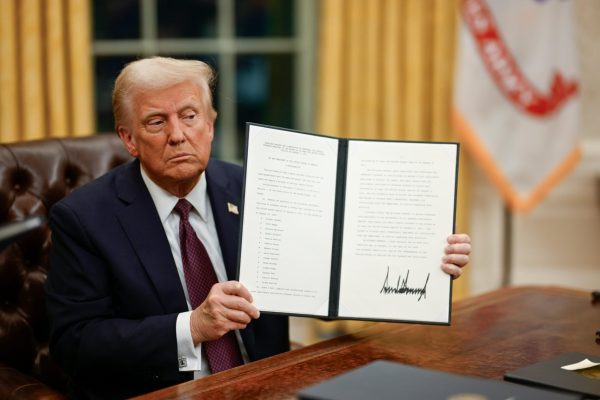Crisis Over Ukraine: Clarke Forum Event

Photo courtesy of Eleanor Nolan ’25
The Clarke Forum recently hosted a panel to discuss the current crisis between Russia and Ukraine. Professors Russell Bova, Karl Qualls, Andrew Wolff, and Elena Duz gathered to talk about not only the current situation, but what the future might look like for the two nations, especially in terms of military action from various actors involved.
Karl Qualls, a professor of History at Dickinson, began the discussion by providing a brief history of the relationship between Russia and Ukraine. He spoke on the discrepancies between Putin’s claims regarding Russian and Ukrainian relations against historical facts that are proven to be true. Specifically, Qualls rebuts Putin’s claim that Ukraine was once a part of Russia. Qualls clarified that this claim is untrue and the similarities between the countries are comparable to that of the USA and Canada. Both countries were once a part of the Soviet Union, but the historic overlap between Ukraine and Russia was a Slovak state called Kievan Rus that existed from about 862 to 1242 CE. Although these countries share a great amount of history, Qualls argues that Ukraine was never truly a part of Russia.
Russell Bova, professor of International Relations, then began to discuss the current political tensions between Russia and Ukraine. He moved to answer three questions: What does Russia want in relation to Ukraine? What is the likelihood of a military invasion of Ukraine? How did we get here and to what extent are Russia grievances legitimate?
According to Bova, Putin sent President Biden a list of requests stating that, if agreed to, he would pull Russian troops from Ukraine’s border. The issue lies not only within the requests themselves, Bova argues, but the limited time Putin allowed for President Biden’s response. Putin asked for a commitment from the United States that Ukraine would not join the North Atlantic Treaty Organization (NATO), and that NATO would not send troops to aid Ukraine. He also demanded that NATO not expand to include any more countries, and that NATO military stations be limited to countries that joined before 1997. To summarize, Biden said no to Putin’s demands.
Bova then moved on to his second question: what is the likelihood of a military invasion of Ukraine? To this he provided two perspectives. The first was what Bova claimed as being the most pessimistic view of the situation, that from the beginning Putin wanted diplomacy to fail. The other, which Bova claimed was much more plausible, was that Putin was participating in what is known as coercive diplomacy, which uses a demonstration of military power to pressure state actors into agreeing to demands they would not otherwise. To emphasize his point, Bova stated that, “We have passed the point of no return… Putin has passed the point of no return… he needs more than just a symbolic offering.”
Bova’s final question was how did we get here, and does Russia have legitimate grievances that led them to this sort of aggression? Bova stated that considering the recent expansion of NATO, especially because it was originally formed to counter Russia and the Soviet Union, it is rational that Putin might react in such a way.
Andrew Wolff, associate professor of Political Science and International Studies, spoke next, focusing on the West’s reaction to Putin and how that impacted the overall tensions of the standoff. He revisited the list of demands Bova mentioned previously, stating that he believed that their extreme nature indicated Putin will not stand down. Putin had asked for Biden’s response in a week from receiving them and Biden took about a month to finally reply. Since then, Putin has met with several other leaders of various countries, including France’s president, Emmanuel Macron. However, instead of pulling troops back from countries that joined after 1977, many countries have increased military power in eastern Europe to potentially counter Putin’s increasing military presence around Ukraine.
Wolff also states that because Ukraine is not a member of the NATO alliance, Title V- Collective defense does not apply if they are invaded by Russia. This means that there is no alliance making any of NATO’s members come to Ukraine’s aid.
The final panelist to speak was Elena Duzs, who is Russian herself and spends a considerable amount of time in Russia visiting family. She began by describing the United States’ obsession with war, claiming that Biden was attempting to escalate the situation in the eyes of the American people. She added that the United States needs there to be a threat of war for Biden to “show his muscles.” She said that Russia does not want war, rather that the United States is twisting the situation for their benefit.
Duzs said that, if anything, Putin is acting in ways to get the West, specifically the US, to sit down and discuss serious issues such as missiles with Russia. She focused on the idea that nothing is changing between Ukraine and Russia and that Putin is just using this as an opportunity to begin negotiations with the West.
Tensions between Russia and Ukraine continue to grow and develop daily but understanding the history and perspectives at play help to visualize possible actions on both sides.







Emma • Mar 2, 2022 at 6:14 am
Thank God, I was able to flee Ukraine and Russia with my two siblings and cousin to a safe zone and Canada. Milan assisted me with their relocations as well as all of the required paperwork. I’m only providing it to assist the victims and their families. (humanitarianaidanddevelopment”@”yahoo”.”com”) is their e-mail address.